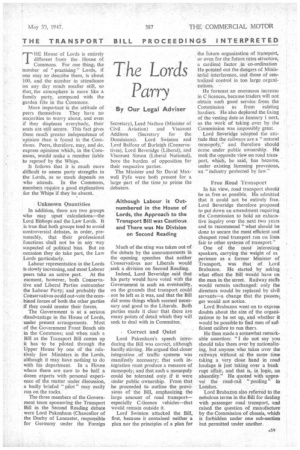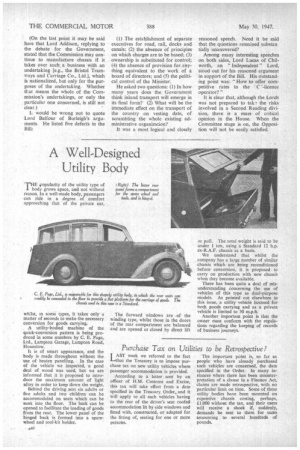The Lords Parry
Page 49

Page 50

If you've noticed an error in this article please click here to report it so we can fix it.
By Our Legal Adviser THE House. of Lords is entirely different from the House of Commons. For one thing, the number of " practising" Lords, if one may so describe them, is about 100, and the number in attendance on any day much smaller still, so that, the atmosphere is more like a family party, compared with the garden fete in the Commons, More important is the attitude of peers themselves They have no majorities to worry about; and even if they displease everybody, their seats are still secure. This fact gives them much greater independence of opinion than is found in the ComiciOns. Peers, therefore, may, and do, express opinions which, in the Commons, would make a member liable to reproof by the Whips.
• It follows that it is much more difficult to assess party strengths in the Lords, as so much depends on who attends. In the Commons, members require a good explanation for the Whips if they be absent, Unknown Quantities In addition, there are two groups who may upset calculations—the Lord Bishops and the Law Lords. It is true that both groups tend to avoid controversial debates, in order, presumably, that their professional functions shall not be in any way suspected of political bias. But on occasion they do take part, the Law Lords particularly.
Labour representation in the Lords is slowly increasing, and most Labour peers take an active part. At the moment, however, both Conservative and Liberal Parties outnumber the Labour Party; and probably the Conservatives could out-vote the combined forces of both the other parties if they could muster their forces.
The Government is at a serious disadvantage in the House of Lords, under present arrangements. Most of the Government Front Bench sits in the Commons; and when such a Bill as the Transport Bill comes up it has to be piloted through the Upper House by one Of the relatively few Ministers in the Lords, although it may have nothing to do with his department. In a House where there are sure to be half a dozen experts with personal experience of the matter under discussion, a badly briefed " pilot" may easily run on the rocks.
The three members of the Government team sponsoring the Transport Bill in the Second Reading debate were Lord Pakenham (Chancellor of the Duchy of Lancaster, responsible for Germany under the Foreign Secretary), Lord Nathan (Minister of Civil Aviation) and Viscount Addison (Secretary for the Dominions). Lord Swinton and Lord Balfour of Burleigh (Conservatives), Lord Beveridge (Liberal), and Viscount Simon (Liberal National), bore the burden of opposition for their respective parties, The Minister and Sir David Maxwell Fyfe were both present for a large part of the time to prime the debaters.
Much of the sting was taken out of the debate by the announcements in the opening speeches that neither Conservatives nor Liberals would seek a division on Second Reading.
Indeed, Lord Beveridge said that his party would have voted with the Government in such an eventuality, on the grounds that transport could not be left as it was, and that the Bill did some things which seemed necessary and good to the Liberals. Both parties made it clear that there are many points of detail which they will seek to deal with in Committee.
Correct and Quiet Lord Pakenham's speech introducing the Bill was correct, although hardly stirring. He argued that closer integration , of traffic systems was manifestly necessary; that such integration must produce a measure of monopoly; and that such a monopoly could be tolerated only. if it were under public ownership. From that he proceeded to outline the provisions of the Bill, emphasizing the large amount of road transport— especially C-licence vehicles—that would remain outside it.
Lord Swinton attacked the Bill, first, because it contained neither a plan nor the principles of a plan for the future organization of transport, or even for the future rates structure, a cardinal factor in co-ordination He pointed out the dangers of Ministerial interference, and those of centralized control in too large organizations.
He forecast an enormous increase in C licences, because traders will not obtain such good service from the Commission as from existing hauliers. He also deplored the fixing of the vesting date as January 1 next, as the work of taking over by the Commission was impossibly great.
Lord Beveridge adopted the attitude that the railways. are a "natural monopoly,' and therefore should come under public ownership. He took the opposite view on road transport, which, he said, has become, under existing licensing provisions, an "industry protected by law."
Free Road Transport In his view, road transport should be as free as possible. He admitted that it could not be entirely free. Lord Beveridge therefore proposed to put down an amendment requiring the Commission to hold an exhaustive inquiry over the next two years and to recommend " what should be done to secure the most efficient and cheapest road transport run on lines fair to other systems of transport."
One of the most interesting speakers, carrying the weight of ex perience as a former Minister of Transport, was that of Lord Brabazon. He started, by asking what effect the Bill would have on the man in the street. Railway staffs would remain unchanged: only the directors would be replaced by civil servants—a change that the passel% ger would not notice.
Lord Brabazon went on to express doubts about the size of the organizations to be set up, and whether it would be possible to find men of sufficient calibre to run them.
He then made a somewhat remarkable assertion: "I do not say you should take 'them over by nationalizing, but anyone who takes over the railways without at the same time taking a very close hand in road haulage is 'just taking over a bank rupt affair, and that is, in logic, an absurdity?' He quoted with approval the road-rail " pooling " in London.
Lord Brabazon also referred to the nebulous terms in the Bill for dealing with passenger road transport, and raised the question of manufacture by the Commission of chassis, which is forbidden under one sub-section but permitted under another. (On the last point it may be said here that Lord Addison, replying to the debate for the Government, stated that the Commission may continue to manufacture chassis if it takes over such a business with an undertaking [e.g., the Bristol Tramways and Carriage Co., Ltd.], which is nationalized, but only for the purposes of the undertaking. Whether that means the whole of the Commission's undertakings, or only the particular one concerned, is still not clear.)
1. would be wrong not to quote Lord Balfour of Burleigh's arguments He listed five defects in the Bill: (1) The establishment of separate executives for road, rail, docks and canals; (2) the absence of principles on which charges are to be based; (3) ownership is substituted for control; (4) the absence of provision for anything equivalent to the work of a board of directors; and (5) the political control of the Minister.
He asked two questions: (1) In how many years does the Government think inland transport will emerge in its final form? (2) What will be the immediate effect on the transport of the country on vesting date, of scrambling the whole existing administrative organization?
It was a most logical and closely reasoned speech. Need it be said that the questions remained substan tially unanswered?
Among many interesting speeches on both sides, Lord Lucas of Chilworth, an " Independent " Lord, stood out for his reasoned argument in support of the Bill. His outstanding point was: "How to offer competitive rates to the ' C '-licence operator?"
It is clear that, although the Lords was not prepared to tak the risks involved in a Second Reading division, there is a mass of critical opinion in the House. When the Committee stage is on, the Opposition will not be easily satisfied.












































































